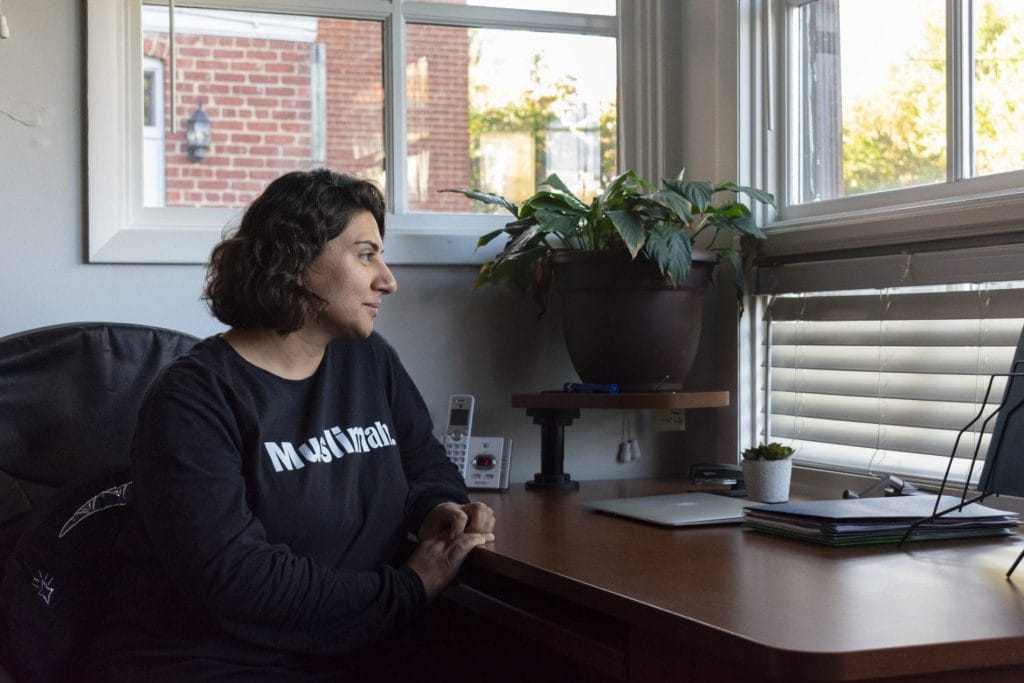Fight the Muslim Ban founder, Richmond resident says she likes ‘busting stereotypes’

Photo by Enza Marcy
Taylor Toben, Contributing Writer

When President Donald Trump announced a travel ban on people from majority-Muslim countries in 2017, Seema Sked was devastated. The event changed her life, she said, by launching her into activism.
“I was a wreck,” said Sked, who immigrated to the United States when she was two years old. “After that, I attended my very first protest against the ban that weekend in downtown Richmond.”
Now, the Richmond resident is an advocacy coordinator for the Richmond Peace Education Center and founder of activist group Fight the Muslim Ban. The travel ban continues to affect people from Libya, Somalia, Sudan, Syria, Yemen, Iran and Iraq, but the list of affected countries continues to change.
That first protest touched her the most, Sked said. She remembers seeing people of all ages, and a few protesters carried a flag that read “Sí se puede,” which translates to “Yes we can” in English.
Later that year, she went to her second protest. It was the counterprotest to the “Unite the Right” rally in Charlottesville in August 2017, in which a white nationalist killed a woman when he drove his car into a crowd.
“Being there and seeing all that hate was something that I really needed to see,” Sked said.
After that, she made the choice to become more involved. Sked called Council on American-Islamic Relations, or CAIR, a civil rights organization for Muslims in the U.S., to ask what she could do to help fight the travel ban.
She began a campaign that asked people to create and send handwritten postcards to encourage their representatives to support bills that would reduce the ban’s effects. Through this process, 5,000 postcards were sent out.
Sked attended the first congressional hearing on the Muslim ban, where she heard stories of people who haven’t seen their families in years; a mother desperate to see her ill 2-year-old child tried for more than a year to enter the U.S., only to spend 10 days with him before he died.
Now, Sked’s advocacy through Fight the Muslim Ban focuses on new bills pushing to remove the ban. The group’s Facebook page spreads information about the ban, events in the area and information on how to become involved.
Sked’s advocacy is not limited to her organizations. She traveled to the Southern border to help asylum seekers understand their rights, and has attended several protests in D.C.
When Supreme Court Justice Brett Kavanaugh — who was accused of sexual assault — was appointed, Sked was there to protest the same day as the Senate confirmation, she said.
“I sat on the floor at one of the buildings and chanted with several hundred people until I was arrested,” Sked said.

Through her work at the Richmond Peace Education Center, or RPEC, Sked has organized advocacy events, including the program’s most recent, “Teach-in on Immigrant Social Justice” held in Monroe Park a few weeks ago.
The event featured performances and speeches from activists and members of minority communities. Faith leaders and allies were also a part of the conversation of sharing experiences, knowledge and expertise.
“I wanted the voices to be heard that never get heard,” Sked said about the event.
RPEC focuses on conflict resolution, training and healing. It also offers programs for students to learn how to diffuse conflict and violence.
The organization offers training events, including nonviolent direct action and conflict resolution training. These courses recommend ways to be prepared in advocacy and ways to diffuse conflicts. This also includes trauma healing trainings that teach people how to process and begin healing from trauma.
“Organizing is about building relationships,” Sked said. “I really like busting stereotypes. If nothing else, people have now met a Muslim, somebody who doesn’t fit their idea of a Muslim. I have the opportunity to change somebody’s perspective.”


